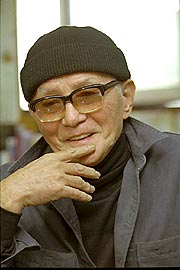Kihachi Okamoto
| Kihachi Okamoto | |
|---|---|
 |
|
| Born |
February 17, 1924 Yonago, Tottori, Japan |
| Died | February 19, 2005 (aged 81) Kawasaki, Kanagawa, Japan |
| Occupation | Film director and screenwriter. |
Kihachi Okamoto (岡本 喜八 Okamoto Kihachi?, February 17, 1924 – February 19, 2005) was a Japanese film director who worked in several different genres.
Born in Yonago, Okamoto attended Meiji University, but was drafted into the Air Force 1943 and entered World War II, an experience that had a profound effect on his later film work, one third of which dealt with war. Finally graduating after the war, he entered the Toho studies in 1947 and worked as an assistant under such directors as Mikio Naruse, Masahiro Makino, Ishirō Honda, and Senkichi Taniguchi. He made his debut as a director in 1958 with All About Marriage.
Okamoto directed almost 40 films and wrote the scripts for at least 24, in a career that spanned almost six decades. He worked in a variety of genres, but most memorably in action genres such as the jidaigeki and war films. He was known for making films with a twist. Inspired to become a filmmaker after watching John Ford's Stagecoach, he would insert elements of the Western in war films like Desperado Outpost (1959) and Westward Desperado (1960), and eventually even filmed his own samurai Western in East Meets West (1995). A fan of musicals, he made over-the-top films such as Oh Bomb (1964), a gangster Noh musical, and Dixieland Daimyo (1986), about jazz musicians entering Bakumatsu Japan. Over all, he took on "a very rhythmic approach to filming and editing action sequences. Carefully timed placement of sound effects and music combined with camera movement and movement within the frame to form a very rhythmic, almost musical whole." His basically critical stance towards Japanese society led him to often pursue satire and black comedy, with his The Age of Assassins (1967) becoming so dark and absurd, Toho initially refused to release it.
...
Wikipedia
